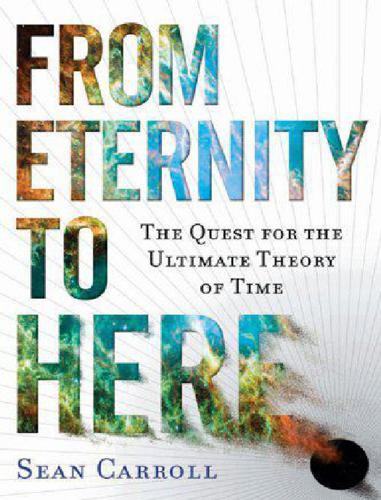
From eternity to here: the quest for the ultimate theory of time
by
Sean M. Carroll
Published 15 Jan 2010
So the reductio ad absurdum of this scenario is that the overwhelming majority of intelligences in this multiverse will be lonely, disembodied brains, who fluctuate gradually out of the surrounding chaos and then gradually dissolve back into it. Such sad creatures have been dubbed “Boltzmann brains” by Andreas Albrecht and Lorenzo Sorbo.188 You and I are not Boltzmann brains—we are what one might call “ordinary observers,” who did not fluctuate all by ourselves from the surrounding equilibrium, but evolved gradually from an earlier state of very low entropy. So the hypothesis that our universe is a random fluctuation around an equilibrium state in an eternal spacetime seems to be falsified.
…
No matter how many ordinary observers exist in our universe today, they would be dwarfed by the total number of Boltzmann brains to come. Any given observer is a collection of particles in some particular state, and that state will occur infinitely often, and the number of times it will be surrounded by high-entropy chaos is enormously higher than the number of times it will arise as part of an “ordinary” universe. Just to be careful, though—are you really sure you are not a Boltzmann brain? You might respond that you feel the rest of your body, you see other objects around you, and for that matter you have memories of a lower-entropy past: All things that would appear inconsistent with the idea that you are a disembodied brain recently fluctuated out of the surrounding molecules.
…
In the Boltzmann-Lucretius scenario, we don’t have recourse to the Past Hypothesis, so it is overwhelmingly likely that all of our memories are false. Nevertheless, we are perfectly justified in dismissing this possibility, as long as we think carefully about what precisely we are claiming. It’s not right to say, “I know I am not a Boltzmann brain, so clearly the universe is not a random fluctuation.” The right thing to say is, “If I were a Boltzmann brain, there would be a strong prediction: Everything else about the universe should be in equilibrium. But it’s not. Therefore the universe is not a random fluctuation.” If we insist on being strongly skeptical, we might wonder whether not only our present mental states, but also all of the additional sensory data we are apparently accumulating, represent a random fluctuation rather than an accurate reconstruction of our surroundings.
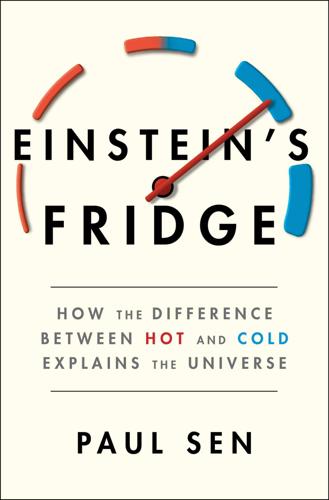
Einstein's Fridge: How the Difference Between Hot and Cold Explains the Universe
by
Paul Sen
Published 16 Mar 2021
When the mathematician Ernst Zermelo published a critique in 1896, for instance, Boltzmann began his defense, “Zermelo’s paper shows that my writings have been misunderstood; nevertheless it pleases me for it seems to be the first indication that these writings have been paid any attention in Germany.” Nonetheless, Boltzmann was still capable of original thought. His rebuttal of Zermelo contained many remarkable ideas, the most striking of which is the first statement from scientific reasoning alone that the universe must have originated in a single moment of creation. CHAPTER TWELVE Boltzmann Brains I sleep badly and am quite beside myself with misery.… Please forgive me everything! —Ludwig Boltzmann In 1854, William Thomson had concluded from observing heat dissipate through an iron bar that the universe must die. Four decades later, spurred by criticism, Ludwig Boltzmann would argue that the statistical explanation of entropy implied that the observable universe must have been born.
…
Take that line of reasoning to its extreme conclusion, and you end up with the idea that a fluctuation that brings only a single brain into existence is far more statistically likely than any of the above. Boltzmann’s explanation for the original low-entropy state of our universe therefore leads to the solipsistic conclusion that all that exists is one brain, which holds the entire cosmos as a figment of its imagination. Scientists now refer to this hypothetical entity as a Boltzmann brain. Few favor such an explanation, although no one has yet come up with a definitive explanation for why the universe did begin in such an unlikely low-entropy state. As the great American physicist Richard Feynman, speaking in the 1950s during his now-famous lectures on physics, put it: “For some reason, the universe at one time had a very low entropy for its energy content, and since then the entropy has increased.
…
“Whether I will soon be alone”: Ludwig Boltzmann: Life and Letters by Walter Höflechner, as quoted in Boltzmann’s Atom by Lindley. “Shouldn’t the irresistible urge”: See above. Zermelo’s papers: Wissenschaftliche Abhandlung von Ludwig Boltzmann edited by Fritz Hasenhoehrl, as quoted in Boltzmann’s Atom by Lindley. Chapter Twelve: Boltzmann Brains I sleep badly: Ludwig Boltzmann: Life and Letters by Walter Höflechner, as quoted in Boltzmann’s Atom: The Great Debate That Launched a Revolution in Physics by David Lindley. universe must have been born: See “On Zermelo’s Paper ‘On the Mechanical Explanation of Irreversible Processes’ ” by Ludwig Boltzmann, 1897.
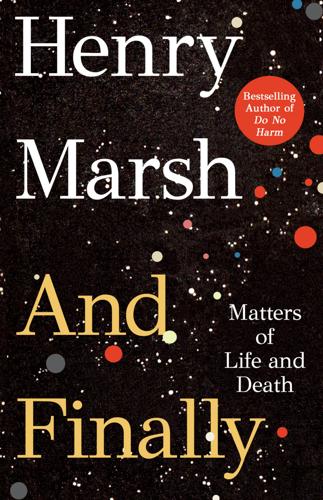
And Finally
by
Henry Marsh
And even less improbable for the solar system and, so the argument goes, even less improbable that billions of particles might suddenly assemble themselves into a brain. So perhaps I am a Boltzmann brain, and what I think is the real world is just a pattern of electrochemical impulses in my brain, formed by randomly self-assembled particles of matter. Which, in a sense, it is, whether you believe in the possibility of Boltzmann brains or not. There is, however, a problem with life extension for sceptics like me. There is good evidence that increasing lifespan – at least in mice and worms – can prolong not just life but healthy life, healthspan as well as lifespan.
…
But I am appalled by the suffering that the decline and end of the human race will probably involve, and I think about my granddaughters and their possible descendants, and climate change, and all that it will bring in its wake. Although most cosmologists reckon that the universe will eventually come to an end, it is an incomprehensibly long time away. Some of them have come up with the disconcerting idea of Boltzmann brains. The Second Law of Thermodynamics (developed by Ludwig Boltzmann in the latter part of the nineteenth century) explains thermodynamics – the study of matter, energy and heat – in terms of statistical probability. There is no law which says that the trillions of gas atoms flying about randomly in the room I am sitting in cannot suddenly rush out of the window and leave me gasping for air.
…
I do not believe I will be either punished or rewarded after I have died, or that I might become an unhappy ghost who haunts the world of the living. Admittedly, surveys show that most people in the modern world who believe in an afterlife believe only in heaven, and not in hell. Once you accept the message of neuroscience that thought and feeling are physical phenomena, an afterlife seems as unlikely as Boltzmann brains. There are a few neuroscientists I know who, somehow or other, manage to maintain a belief in an afterlife. One of them wrote to me, when he heard of my diagnosis, to tell me that our lives were just the canapés and pre-dinner drinks to the heavenly banquet, as he put it, that awaited those of us who had bought tickets.

The Milky Way: An Autobiography of Our Galaxy
by
Moiya McTier
Published 14 Aug 2022
You can find other equally tongue-twisting number words at Landon Curt Noll, “English Names of the First 10000 Powers of 10 - American System Without Dashes,” Landon Curt Noll (blog), https://lcn2.github.io/mersenne-english-name/tenpower/tenpower.html. 2 These hypothetical free-floating brains were called Boltzmann Brains, named after Ludwig Boltzmann, who did NOT come up with the idea. Most scientists would dismiss Boltzmann Brains as silly, but that doesn’t stop physicists from getting into the most frustrating conversations about whether all of human existence is just one random brain floating for an instant in the universe. 3 Brown dwarfs are the limbo space between planets and stars.
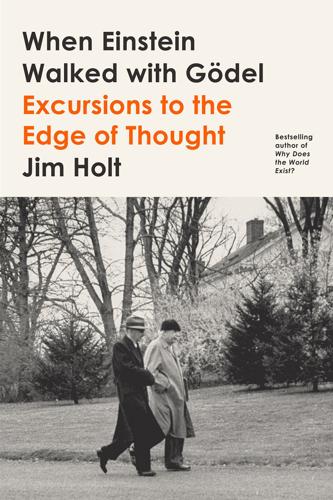
When Einstein Walked With Gödel: Excursions to the Edge of Thought
by
Jim Holt
Published 14 May 2018
Indeed, in the fullness of time, quantum physics could allow for an infinite number of such disembodied brains, stocked with (false) memories, that will appear and disappear. In the scientific literature, these sad and evanescent entities are called Boltzmann brains (after Ludwig Boltzmann, one of the pioneers of modern thermodynamics). One such deep-future Boltzmann brain would be identical to your own brain as it is constituted at this very moment. Thus, in some inconceivably distant epoch, your current state of consciousness would be re-created out of the void, only to be extinguished an instant later—not, perhaps, the kind of resurrection you were hoping for.
…
Bers, Lipman Bettencourt, Liliane Bhagavad Gita big bang Bigelow, Julian biology; mathematical biotechnology bipolar disorder, see manic depression Birch, Frank Birch and Swinnerton-Dyer conjecture Birkerts, Sven Blackburn, Simon Black Cloud, The (Hoyle) black holes Black-Scholes equation Blake, William Blakeslee, Sandra Bleak House (Dickens) Bletchley Park Block, Ned Bloomsbury group Bogdanov, Igor and Grichka Bohr, Niels Bok, Derek Bolsheviks “Boltzmann brains” Bolyai, János Bonn University Book of Dead Philosophers (Critchley) Boole, Mary Borel, Émile Borges, Jorge Luis Boston University Bott, Raoul Bourbaki cabal Bourdieu, Pierre Bowen, Elizabeth Bradbury, Ray Brahe, Tycho brain scans Branch, Taylor Brandeis University Braudel, Fernand Breaking the Code (Whitemore) Brezhnev, Leonid Bride of Science (Woolley) Brief History of Time, A (Hawking) Brin, Sergey British Association Broad Church Broglie, Louis de Brookes, Martin Brooks, David Brouwer, L.E.J.
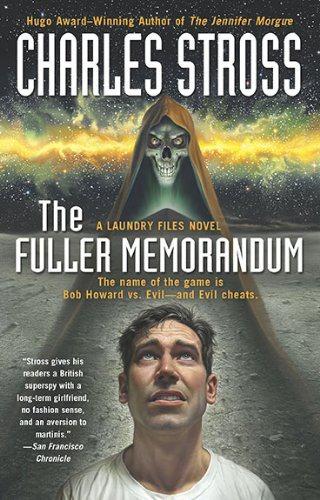
Fuller Memorandum
by
Stross, Charles
Published 14 Jan 2010
(Hell, I've worked with a Deep One. Left a part of my soul behind with her. No matter.) The things that terrify me are blue-green worms, twisting and coiling luminous intrusions glimpsed in the abruptly emptied eyes of a former colleague; minds patient and incomprehensibly old that find amusement in our tortured writhing; Boltzmann Brains from the chaotic, necrotic depths of the distant future, reaching back through the thinning ultrastructure of spacetime to idly toy with our reality. Things that go "bump" in the night eternal. Things that eat us-- There is a fourth and final philosophy by which some of us live our lives, and it boils down to this: do not go quietly into that dark night.